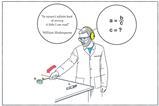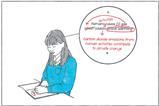Use these suggestions to guarantee your student feedback hits the mark every time

If a genie could fund one thing for every chemistry teacher in the country, what would you want? When Teacher Tapp asked all subject teachers this in 2019, a majority opted for a marking assistant that could mark for them two hours a week (21%). That’s more than opted for a £1000 pay rise (16%)!
Written marking is time-consuming, so much so that many of schools have moved to policies of zero written marking with an emphasis on verbal feedback instead. I know one teacher who chose to double their commute just to work at one. Yet advocates of written marking remain. Its proponents argue that it motivates and builds relationships with pupils. With opinions divided, let’s turn to the evidence-base to settle the debate.
In 2021, the Education Endowment Foundation (EEF) published their much-anticipated guidance report: Teacher feedback to improve pupil learning. It wasn’t the nail in the coffin for written marking that some expected (or hoped) it would be. Rather than advocating for any particular method of feedback, the guidance set outs principles that matter most.
Principles not methods
The EEF guidance report states that schools should ‘avoid the over-specification of the wrong things’. These wrong things include:
- Methods of feedback (verbal or written)
- Length or frequency of feedback
- Pen colour
- Specific marking acronyms or codes
Instead, school feedback policies should seek to clarify one thing above all: principles of feedback. The three principles for effective feedback are:
- Lay the foundations for effective feedback
- Deliver appropriately timed feedback that focuses on moving learning forward
- Plan for how pupils will receive and use feedback
How can you apply these principles?
To lay the foundations for feedback, teachers must first provide high-quality instruction. Feedback will only make sense if the prior aims of their lessons have been understood. Teachers must possess a concept of quality and make it explicit to students. This requires more than distributing mark schemes. Instead, a chemistry teacher might provide exemplar responses to longer answer exam questions and deconstruct what makes them successful.
An example of this was pointed out to me at researchED Norwich. The science laboratory where I gave a talk on this topic was decorated by a ‘wall of excellence’ displaying the best of students’ work. Teachers told me that these were in every classroom as part of their school feedback policy. The aim was to create a mental model of what excellence looks like.
This relates to the second of the EEF’s principles of feedback: ensuring feedback is appropriately timed. First establishing a mental model for excellence creates a reference point for feedback later. Without it, you risk creating a ‘gotcha’ moment – when a student realises the expected standard too late (at the point of feedback).
Better timed feedback requires a teacher’s judgement based on the characteristics of the task, knowledge of the individual pupil and understanding the class. Students must be ready for feedback. Their readiness will depend on the chemistry curriculum and the sequence of learning for a given topic.
Once pupils are ready for feedback, teachers must make decisions relating to the third and final principle: plan how pupils will receive and use feedback. When providing feedback on a chemistry assessment, it might be best to talk through the paper first and then hand out individual scripts, ensuring students have first understood your explanations of common misconceptions and features of success. You could take this a step further, by not providing pupils with their actual marks until they have acted on feedback with active thinking and responding to your advice.
Clearly, following the three principles of feedback relies on the teacher’s professional judgement and this should not be swept aside by an over-prescriptive school policy. If you do find yourself hostage to policies and data points, it might be time to politely challenge the status quo. Discussing the EEF guidance with your leadership team might help shift the debate away from methods of feedback, towards its three essential principles.













No comments yet